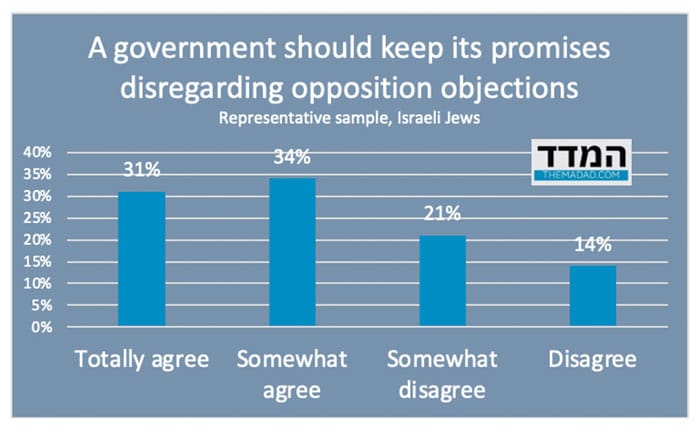 Avi Maoz speaks to the press before a party meeting on November 28, 2022 in Jerusalem, Israel.
(Amir Levy/Getty Images)
Avi Maoz speaks to the press before a party meeting on November 28, 2022 in Jerusalem, Israel.
(Amir Levy/Getty Images) “We barely started and it’s already a conclusion. The battle is over,” you say.
“Over?” I respond. “But Deputy Minister Avi Maoz from the Noam party has not yet taken office.”
“Right, it’s over anyway.”
“And who won that battle?”
“Well, not the incoming coalition.”
“So, that’s it?”
“Eh, not yet. Complacency is dangerous. Besides, Maoz is a tree that will bear more fruit as long as he is still with us. (It’s not a risky bet: He will not be a coalition member for a very long time).”
Now let’s begin from the start. Avi Maoz was appointed to serve as deputy minister in charge of external programming at schools in the incoming coalition. He is an ultra-conservative, anti-LGBT, anti-progressivism, anti-pluralism member of a fringe faction within the (quite radical) Zionist Religious Party. Maoz’ elevation stirred outcry. Letting him have the authority to distribute billions to non-profit organizations that will re-educate the children of Israel was one bridge too far.
But it wasn’t bad for Israel. In fact, I think it was good.
Why? In recent weeks, quite a few movements, groups and organizations in Israel have been searching for something that could motivate the opponents of the new government. Benjamin Netanyahu provided them with an answer. Maoz is the answer. More than helping the incoming coalition with his one vote, he helped the confused opposition with his clear voice. It was almost too easy. Maoz got a job, and the opposition got its battle cry. A string of mayors declared that they will not work with him. Principals and teachers in the secular educational sector expressed outrage. Maoz is exactly what the opposition needed: proof that the new coalition intends to enforce its radical ideology on “our” schools, to influence “our” children, to change “our” lives.
The new coalition has ambitious plans for Israel, some good, some questionable. And as is the habit of new coalitions, the newly elected bosses rush to implement their agenda like a herd of running elephants. Alas, they soon notice, from a distance, an approaching wall. That’s the wall we will call “reality.” It’s a wall that tends to spoil early plans, to moderate ambitions, to alter purposes.
The incoming coalition has plans, but reality places limitations on these plans.
Reality comes in many forms. It can be the U.S. president. Some coalition members toy with certain ideas concerning the West Bank and will soon discover that it’s easy to have ideas and more difficult to see them materialize amid American objections. The Maoz storm was also a reality check. True, the coalition represents a majority that won an election, and yet the Israeli public must be considered as it moves to alter Israel’s policies. The Israeli public can tolerate much, but not everything. Its secular groups — about half of Israel’s Jewish public — would not accept a Maoz-inspired education. Not the teachers, not the parents.
Maoz had no chance. The education system is subject to strong local influences: mayors, principles, parents. He was appointed to a position that depends on the good will, on the cooperation of many, and he will not get such cooperation. His project is doomed. His only role from now moving forward is to become the cardboard figure in an opposition verbal shooting range.
The short fierce battle against Maoz forced the opposition out of a post-election coma and the coalition to begin a necessary process of detox following its victory euphoria.
The short fierce battle against Maoz and his newly created portfolio was a successful battle, and a necessary one, for all parties. It was the right battle at the right moment. Why? Because it forced the opposition out of a post-election coma and it forced the coalition to begin a necessary process of detox following its victory euphoria. It also provided Netanyahu with proof — which will serve him as he battles to control an unruly, unrealistic bunch of coalition members — that not everything is possible. And it provides his opponents with proof, which will serve them later, that there are battles that an opposition can still win.
Something I wrote in Hebrew
Here’s what I wrote about the idea that the Law of Return would be changed:
Supporters of the change say: Most of the immigrants to Israel today are the grandchildren of Jews who are not Jews. If the purpose of the law is to have more Jews in Israel, then we are not fulfilling its purpose. Opponents of the change say: There are hundreds of thousands, perhaps millions, of beloved Jewish families in the world whose grandchildren are not necessarily Jewish. It is impossible to tell all these Jews that their grandchildren no longer belong to the extended family of which we are all sons and daughters. Both sides have strong arguments. Which one is stronger? That is an ideological question. All definitions are somewhat arbitrary. You can expand them or narrow them. It is a question of cost and benefit.
A week’s numbers
Why the opposition must fight:

A reader’s response:
Jay Harwitt wrote: “Dear Mr. Rosner … The Hanukkah story has more urgency than usual. As children, we learned that the Maccabees cast out the wicked Antiochus Epimanes … [in fact the Maccabees were] our ancient Taliban … Like the Taliban, the Maccabees won, and like the Taliban, they began to rule along the same lines that brought them victory … It worked for over 100 years under the Hasmoneans. Do you really believe that the comparable right-wing victors in this most recent election — Bibi, the Haredis and Ben Gvir — have that much time to play with?” My answer: Historical parallels like this one are tricky. They rarely work.
Shmuel Rosner is senior political editor. For more analysis of Israeli and international politics, visit Rosner’s Domain at jewishjournal.com/rosnersdomain.






















 More news and opinions than at a Shabbat dinner, right in your inbox.
More news and opinions than at a Shabbat dinner, right in your inbox.